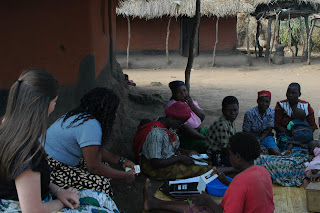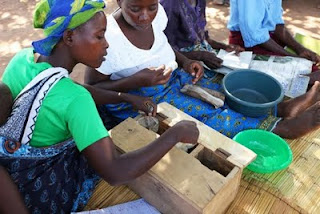 Development is a great word to throw around – it’s a favourite of politicians and NGO workers alike. Everyone seems to be talking about development now days. As an International Poverty and Development Studies (IPDS) student at Avondale College, I knew plenty about development. But coming to ADRA Malawi to see field work in person brought my understanding of development from head knowledge to a first-hand experience.
Development is a great word to throw around – it’s a favourite of politicians and NGO workers alike. Everyone seems to be talking about development now days. As an International Poverty and Development Studies (IPDS) student at Avondale College, I knew plenty about development. But coming to ADRA Malawi to see field work in person brought my understanding of development from head knowledge to a first-hand experience.The ADRA Australia project in Salima, Malawi, was just one of those amazing first-hand experiences. We headed out towards Suzi village in the truck, with Mercy, an ADRA Malawi staff member; Krystle, an ADRA Malawi intern completing her final year before heading home to Australia; and our driver, Godfrey, who did his best to keep us in relative comfort despite the bumpy dirt tracks. I was filled in about the project as we bumped along.
The Suzi village was one of the villages that had received a
 borehole as a result of fundraising in Australia, thanks to the Krystle Clear waters project. However, despite having received the bore, the pump had been disabled until the community showed they had learnt their lessons about health and sanitation by cleaning up their homes. Our task – to see how well they’d implemented their training, award prizes for the most sanitary and healthy living areas, and determine how soon we could open the bore.
borehole as a result of fundraising in Australia, thanks to the Krystle Clear waters project. However, despite having received the bore, the pump had been disabled until the community showed they had learnt their lessons about health and sanitation by cleaning up their homes. Our task – to see how well they’d implemented their training, award prizes for the most sanitary and healthy living areas, and determine how soon we could open the bore.The checklist – each household needed a pit latrine, a rubbish pit, a kitchen, a dish rack to keep eating utensils on, a smeared house and solid floor, and a bathing area. Through the village we went, checking off items on the list as we came through. This was development first-hand – these people lived in conditions that would be unheard of back home in Australia. A few small children started crying when they saw us and ran to hide. I asked Mercy why – she told me that it was because the children had never been outside this village, and had never seen white people before. They were scared by the colour of our skin!
 The conditions were sad, but not hopeless. Thanks to ADRA’s community programs, those in villages such as Suzi are learning health and sanitation skills, despite their living conditions. And they were improving. The homes with the greatest improvements since the last visit were rewarded with prizes such as buckets and containers for water, brooms, and soap. When we left, it was with a hope that it wouldn’t be long before the sanitation of the village would be improved and the bore could be opened, giving life-giving clean water to all.
The conditions were sad, but not hopeless. Thanks to ADRA’s community programs, those in villages such as Suzi are learning health and sanitation skills, despite their living conditions. And they were improving. The homes with the greatest improvements since the last visit were rewarded with prizes such as buckets and containers for water, brooms, and soap. When we left, it was with a hope that it wouldn’t be long before the sanitation of the village would be improved and the bore could be opened, giving life-giving clean water to all.Our next stop was to a village where a savings and loans bank had been started by 14 women in the community. At each meeting, they would look over the books, pay back some of the money towards their loans, and encourage each other with songs and dances. By contributing a certain amount into the ‘bank’ – a locked wooden box, kept safe by one of the members – individuals could borrow money for improvements or investments, such as metal sheeting for their houses
 or starting small businesses to raise an income. They would gradually pay back their loan, plus interest, and another member would be allowed to take out a loan and the cycle would start again. It was wonderful to see this process in action, and hear stories about how helpful the savings and loans bank was to the community. The women also decided on their own initiative to set aside a certain amount to buy necessities, such as soap, to be shared throughout the group, and to contribute to other essential projects that would benefit the entire community. This was development in action, and it was great to see just what education and empowerment can do!
or starting small businesses to raise an income. They would gradually pay back their loan, plus interest, and another member would be allowed to take out a loan and the cycle would start again. It was wonderful to see this process in action, and hear stories about how helpful the savings and loans bank was to the community. The women also decided on their own initiative to set aside a certain amount to buy necessities, such as soap, to be shared throughout the group, and to contribute to other essential projects that would benefit the entire community. This was development in action, and it was great to see just what education and empowerment can do! These experiences reinforced the essence of development in my mind – offering those in need a hand up, not a hand out. By helping to enable these people to help themselves out of poverty, we can help individuals understand and improve their own standards of living, without fostering dependence by merely giving them the things they need. Teaching people how to improve their lives, and helping them get access to the tools they need, is what development is all about.
These experiences reinforced the essence of development in my mind – offering those in need a hand up, not a hand out. By helping to enable these people to help themselves out of poverty, we can help individuals understand and improve their own standards of living, without fostering dependence by merely giving them the things they need. Teaching people how to improve their lives, and helping them get access to the tools they need, is what development is all about.Development. It’s not an empty word. It’s active, it’s essential, and it’s happening everywhere, thanks to projects that ADRA and other NGOs are implementing around the world.
Next time you get a drink of clean water, think of those for whom this would be a luxury – and of the things you can do to make developments like this a reality.













